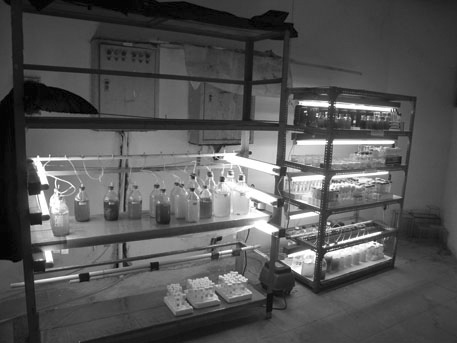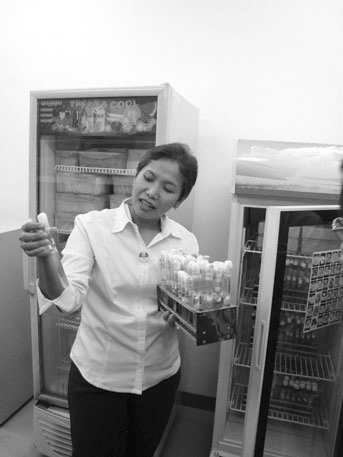Japan's Official Development Assistance White Paper 2010
Keyword 4 The Tenth Meeting of the Conference of the Parties (COP 10) to the Convention on Biological Diversity (CBD)
Biological diversity is an invaluable resource which has been nurtured over the long history of the Earth. The blessings of biodiversity are used by humankind in a wide range of areas, including food, medicine, and science. In recent years, awareness has risen about the devastating impacts of biodiversity loss on the Earth's entire ecosystem and human well-being, and its importance has drawn greater attention.
In this context, the Tenth Meeting of the Conference of the Parties (COP10) was held in Nagoya, Aichi Prefecture in October 2010, chaired by Minister of the Environment Ryu Matsumoto. Following intense negotiations which continued late into the night due to different opinions between developing and developed countries on the major themes of COP10, including "global targets for 2011 onward" and "access and benefit-sharing (ABS) of genetic resources," the meeting ultimately produced historic outcomes.
The 2010 Biodiversity Target, a global target "to achieve by 2010 a significant reduction of the current rate of biodiversity loss" was agreed upon at the 6th Conference of the Parties (COP 6) in 2002. It was reported, however, that the 2010 Biodiversity Target could not be achieved due to failure to foster the full contributions of all countries and stakeholders. Thus, the "Aichi Biodiversity Targets (the Strategic Plan for Biodiversity 2011– 2020)," which prioritizes the establishment of clear and realistic global targets for 2011 onward, were adopted at COP10. It is hoped that the adoption of the Aichi Biodiversity Targets will promote proactive action with a view to preventing the loss of biological diversity.
In order for Japan to support the efforts of developing countries to achieve the Aichi Biodiversity Targets, Prime Minister Naoto Kan announced the "Life in Harmony Initiative" at COP10 to support developing countries in the area of biodiversity. Japan will continue to support activities aimed at the conservation and sustainable use of biological diversity, based on the Initiative's philosophy of realizing human security, pursuing environmental conservation and development, and contributing to poverty reduction.
In addition, an international agreement on ABS, the "Nagoya Protocol," was adopted at COP10. It is particularly noteworthy that on the occasion of COP10 a protocol was adopted on ABS, which was the subject of decade-long difficult negotiations. It is hoped that the adoption of the "Nagoya Protocol" will enable the establishment of clear rules on access and benefit-sharing of genetic resources, and promote the use of genetic resources and conservation of biological diversity by advancing technical cooperation between providers and users of genetic resources.
Ahead of COP10, the Fifth Meeting of the Conference of the Parties Serving as the Meeting of the Parties to the Cartagena Protocol (*1) on Biosafety (*2) (COP-MOP5) was held. The agenda included liability and redress (who has responsibility and who takes response measures) in the event that transboundary movements of living modified organisms (LMOs), such as their export and import, cause damage to the conservation or sustainable use of biological diversity. The meeting culminated in the adoption of the "Nagoya-Kuala Lumpur Supplementary Protocol," which provides, for example, that Parties to the Protocol identify liable operators, including developers, exporters, and importers, and seek response measures, such as measures to prevent damage and measures to restore biological diversity to the condition that existed before the damage occurred.
COP10 and COP-MOP5 thus produced impressive outcomes and concluded successfully. It is of critical importance that through the steady implementation of these outcomes, the Parties continue their efforts for the conservation and sustainable use of biological diversity.
Japan's Assistance to Developing Countries to Promote the Implementation of the Convention on Biological Diversity (CBD) “Sleeping Microbial Beauties” Projects) (Indonesia)
At a meeting of the high-level ministerial segment of COP10, State Secretary for Foreign Affairs Yutaka Banno announced that Japan, as the chair of COP10, will conduct activities to support partner countries through "Sleeping Microbial Beauties" Projects. The projects will involve technology transfers and human capacity building, aiming to assist the preservation and cultivation of microorganisms in partner countries. The first of these projects will be implemented in Indonesia starting from March 2011, as one of the joint initiatives, namely the Science and Technology Research Partnership for Sustainable Development (SATREPS (*3)), of the Japan International Cooperation Agency (JICA) and the Japan Science and Technology Agency (JST). It is expected that the implementation of this project will help partner countries advance research and development for their own genetic resources and discover valuable unknown microorganisms while preserving the biodiversity and ecosystems within their own borders.

“Sleeping Microbial Beauties” Projects
(Project for Development of Internationally Standardized Microbial Resources Centers as a Core of Biological Resources Center to Promote Life Science Research and Biotechnology)
Examples of microorganisms preserved and managed at Indonesian research institute

Notes:
*1 Cartagena Protocol: A protocol that entered into force in 2003, which provides for the implementation of certain regulations on transboundary movements of living modified organisms (LMOs) that may have adverse effects on biological diversity.
*2 Biosafety refers to the measures adopted to ensure that organisms modified from the use of modern biotechnology do not adversely affect the conservation and sustainable use of biological diversity.
*3 SATREPS: A program for the implementation of international joint research among the universities and research institutes of Japan and those of developing countries on global issues, including the environment, energy, disaster prevention, and infectious disease control, through assistance provided in coordination among MOFA, JICA, and the Ministry of Education, Culture, Sports, Science and Technology (MEXT) and JST.
